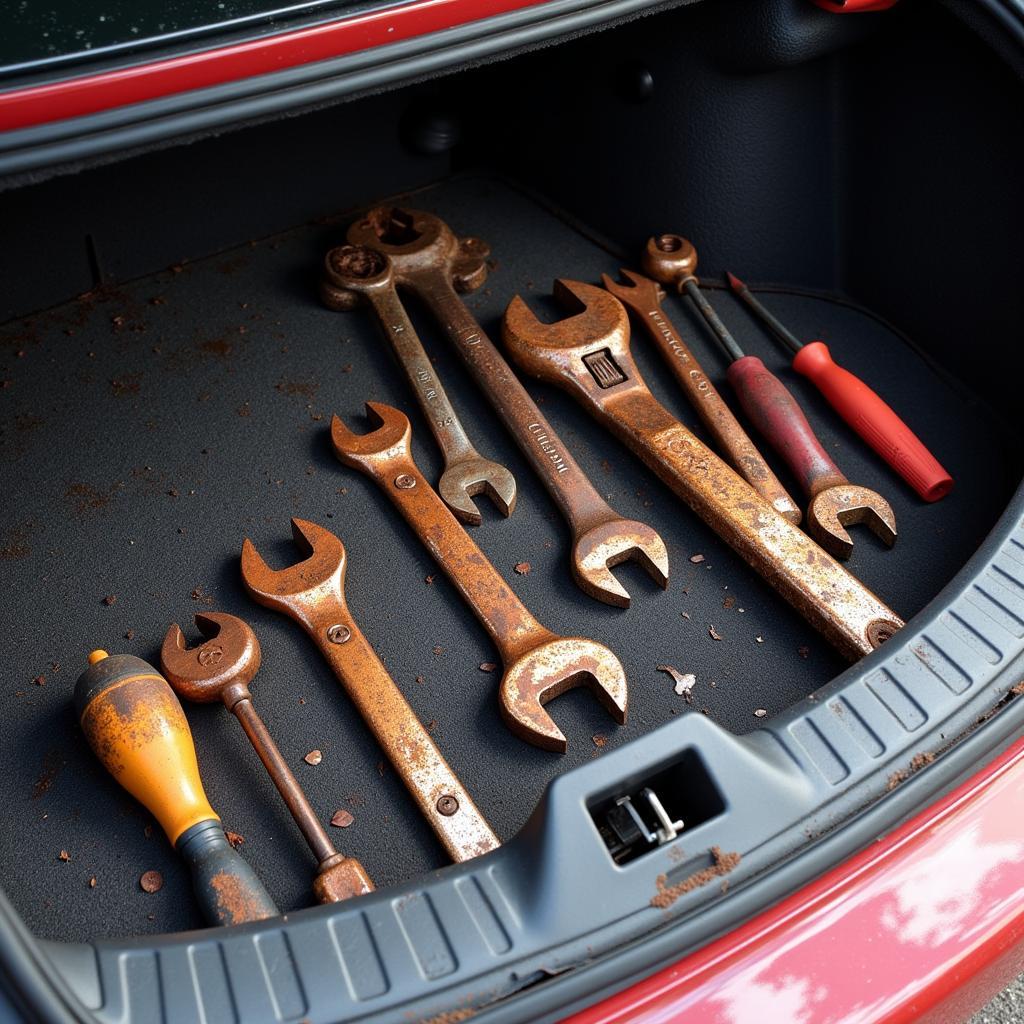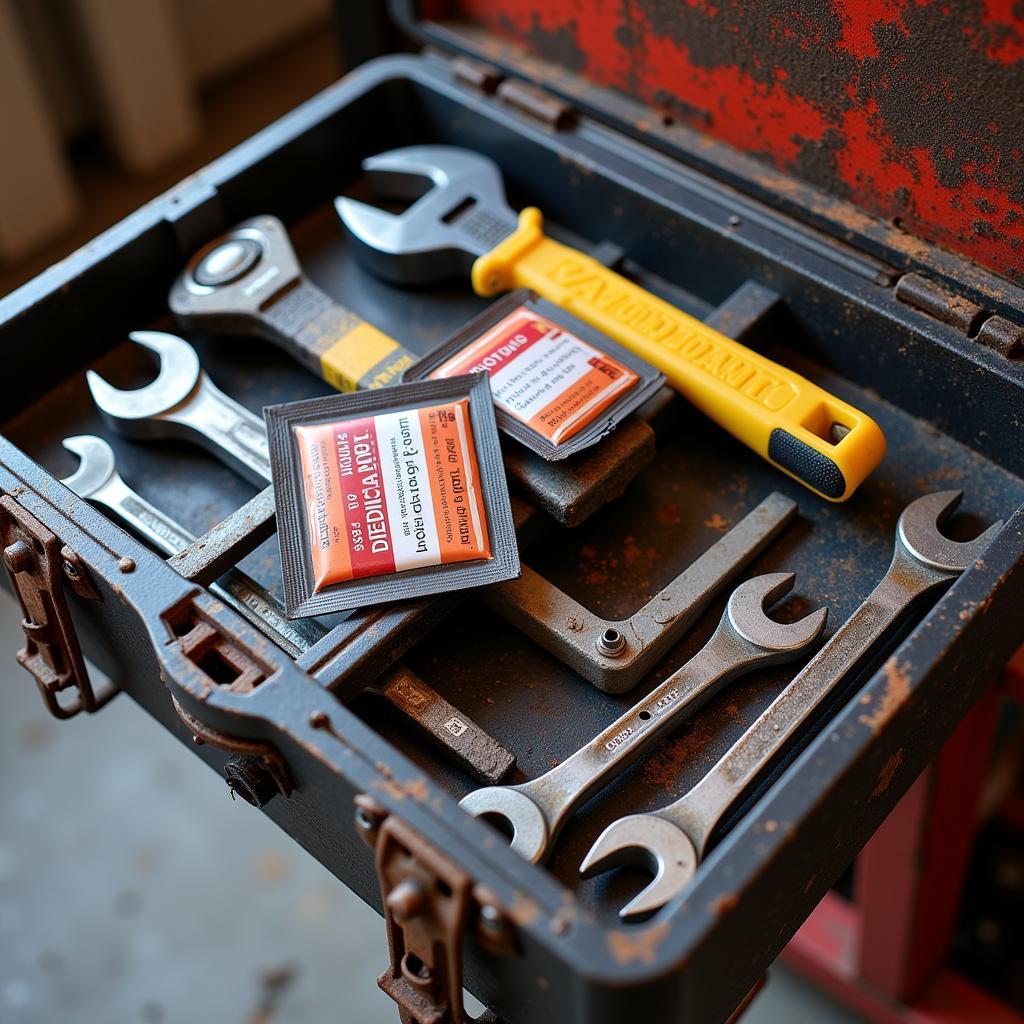Rust on your car tools can be a frustrating and costly problem. But understanding why tools rust in a car is the first step to preventing it. It boils down to the presence of moisture, oxygen, and an electrolyte, which creates the perfect environment for corrosion. Let’s delve into the science behind this common issue and explore effective prevention strategies.
A good set of tools is essential for any car owner, whether you’re a seasoned mechanic or just like to handle basic maintenance yourself. Check out our guide on the best tool kits for cars lifetime warranty to invest in quality tools that will last.
The Science Behind Rust Formation on Car Tools
Rust, scientifically known as iron oxide, is a chemical reaction that occurs when iron or steel alloys are exposed to moisture and oxygen. This reaction, known as oxidation, forms a reddish-brown flaky coating on the metal surface. Inside your car, several factors contribute to this process.
Humidity and Temperature Fluctuations
The interior of a vehicle can experience significant temperature fluctuations, leading to condensation. This moisture creates a breeding ground for rust. Think about those humid summer days or the temperature swings between day and night – your car becomes a mini sauna, and your tools bear the brunt of it.
Spilled Liquids and Environmental Exposure
Accidental spills of liquids containing electrolytes, like saltwater or even sugary drinks, can accelerate the rusting process. Furthermore, if you live in a coastal area or an environment with high humidity, your tools are even more susceptible to rust.
 Rust Formation on Tools in a Car’s Trunk
Rust Formation on Tools in a Car’s Trunk
Metal Type and Quality
The type of metal your tools are made of plays a significant role. Tools made from high-quality stainless steel or alloys with protective coatings are less prone to rust than those made from cheaper, less durable metals. While stainless steel isn’t completely rust-proof, it offers much better resistance.
Preventing Rust on Your Car Tools
Now that we know why tools rust, let’s discuss how to prevent it.
Proper Storage is Key
Storing your tools in a dry, organized manner is the most effective way to prevent rust. A toolbox with a tight-fitting lid can significantly reduce moisture exposure. Adding desiccant packets inside the toolbox can absorb excess moisture and further protect your tools. Consider a dedicated tool chest or drawer system in your garage for long-term storage.
If you’re looking to expand your tool collection, a 120 piece car maintenance tool set might be a good option for you, offering a comprehensive selection of tools for various automotive tasks.
Keep Tools Clean and Dry
Wipe down your tools after each use to remove any moisture, dirt, or grime. This simple step can prevent the build-up of corrosive substances. Apply a light coat of oil or a specialized rust inhibitor to create a protective barrier against moisture.
Control the Car’s Environment
While you can’t completely control the weather, you can minimize moisture inside your car. Use floor mats to absorb spills and consider using a dehumidifier if you live in a particularly humid area. Parking your car in a garage, whenever possible, also helps to regulate the temperature and reduce condensation.
 Best Practices for Car Tool Storage
Best Practices for Car Tool Storage
How to Remove Rust from Car Tools
If you already have rust on your tools, don’t despair! Several methods can help you restore them.
-
White Vinegar Soak: Soaking rusted tools in white vinegar can dissolve rust. After soaking, scrub the tools with a wire brush to remove the loosened rust.
-
Baking Soda Paste: Create a paste of baking soda and water and apply it to the rusted areas. Let it sit for a while, then scrub with a wire brush.
-
Commercial Rust Removers: Various commercial rust removers are available in the market. Follow the manufacturer’s instructions for best results.
Having a reliable tool to check car battery voltage is essential for maintaining your car’s electrical system. A faulty battery can lead to unexpected breakdowns, so ensure you have the right diagnostic tool.
Conclusion
Rust on car tools is a preventable problem. By understanding the factors that contribute to rust formation and implementing the preventative measures outlined above, you can keep your tools in top condition for years to come. Proper storage, regular cleaning, and controlling the car’s environment are key to preventing rust. Remember, taking care of your tools is an investment in your ability to maintain your car effectively. Investing in quality tools and proper storage will save you money in the long run. Why Do Tools Rust In Car? Now you know, and you’re equipped to combat it!
FAQ
-
What causes tools to rust in a car? Moisture, oxygen, and electrolytes create the perfect environment for rust formation.
-
How can I prevent my car tools from rusting? Store them in a dry, airtight container, wipe them down after use, and control the car’s environment.
-
What are the best materials for car tools to prevent rust? Stainless steel and alloys with protective coatings offer the best rust resistance.
-
Can I remove rust from my car tools? Yes, methods like vinegar soaks, baking soda paste, and commercial rust removers can help.
-
Is it worth investing in rust-proof toolboxes? Absolutely! A rust-proof toolbox provides the best protection for your tools.
-
Are there any specific tools for car AC repair that are more prone to rusting? Yes, tools exposed to moisture, like those used for AC repair, require extra care. Consider our car AC repair tools guide for more information.
-
What are some essential car tools to have? Check out our article on car tools to have for a comprehensive list of must-have automotive tools.
Need help with your car diagnostics? Contact us via WhatsApp: +1(641)206-8880, Email: [email protected] or visit us at 910 Cedar Lane, Chicago, IL 60605, USA. Our 24/7 customer support team is ready to assist you.

Leave a Reply